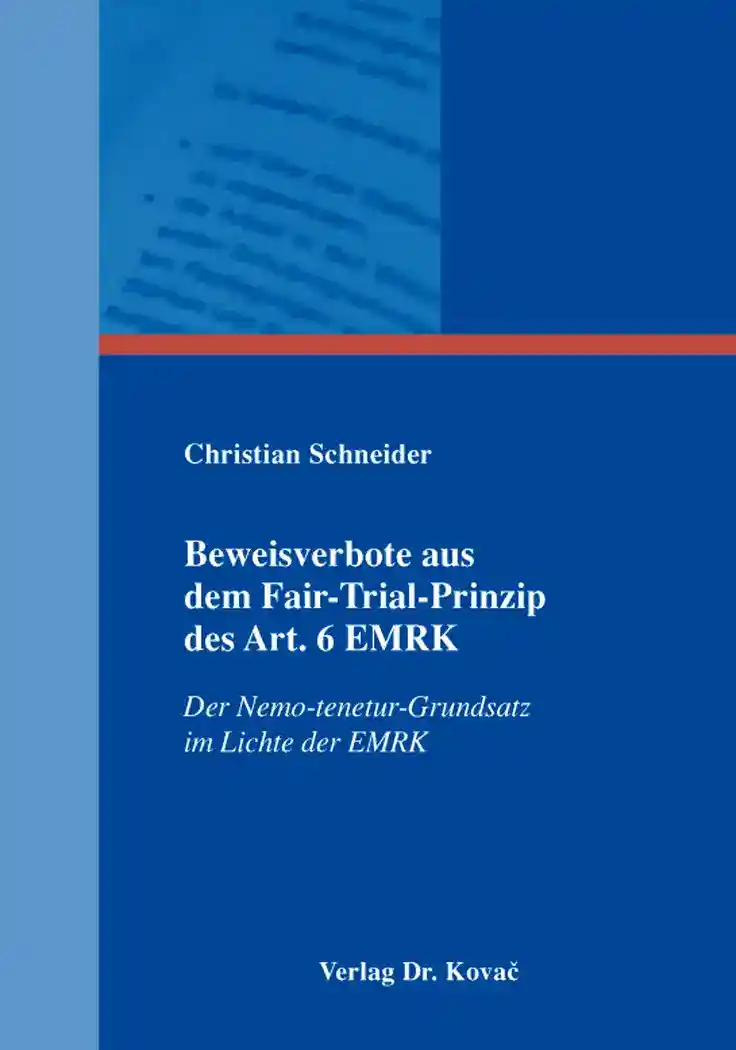Christian SchneiderBeweisverbote aus dem Fair-Trial-Prinzip des Art. 6 EMRK
Der Nemo-tenetur-Grundsatz im Lichte der EMRK
Strafrecht in Forschung und Praxis, volume 284
Hamburg 2013, 442 pages
ISBN 978-3-8300-7383-3 (print) |ISBN 978-3-339-07383-9 (eBook)
Rezension
[...] Die vorliegende Untersuchung unterzieht die Thematik einer eingehenden Erörterung. Sie überzeugt nicht nur durch die erschöpfende Darstellung der Judikatur, sondern auch durch das Aufzeigen von Lösungsansätzen für jene Aspekte, in denen das deutsche Recht den Anforderungen der EMRK nicht voll gerecht wird.
About this book deutschenglish
The importance of the European Convention on Human Rights for German domestic law was recently reinforced repeatedly by the German Federal Constitutional Court. The guarantee of a “Fair Trial” in Para. 1 of Art. 6 ECHR has a high impact especially on domestic criminal procedure law. This work deals with the jurisdiction of the European Court of Human Rights on the problem of exclusion of evidence and puts a focus on the principal “nemo tenetur se ipsum prodere” – the right to remain silent and not to incriminate oneself. The Court deduces rules for the exclusion of evidence in general and the right to silence in particular from the guarantee of the “Fair Trial” in Art. 6 ECHR. But German domestic criminal procedure law provides these regulations as well, even predating those of the ECHR. For a long time their problems were only discussed on the level of domestic law. But how do these domestic and international regulations interelate? Where are their commonalities and where are their differences? The book answers these questions by illustrating the jurisdiction of the ECHR on the rules of exclusion of evidence and outlining its reasoning. Thereafter it examines the scope of the right to remain silent in domestic and international law of the ECHR. The main focus lies on the discussion of the different kinds of oppression and subterfuge of law enforcement which can violate the right to remain silent of the accused. It examines to which extent German criminal procedure law on the one hand and the ECHR on the other hand protect the accused from these violations of their rights and which consequences the distinction of these guarantees may have. The last part discusses the special problem of the “fruit of the poisonus tree doctrine”, the different jurisdiction of the ECHR and the German Federal Supreme Court on this principle and consequences of these differences for German criminal procedure. Overall, this book thus offers an in-depth examination of the Nemo tenetur principle as an interface of the ECHR and German Code of Criminal Procedure and offers solutions for the implementation of the jurisprudence of the ECHR into German domestic criminal procedure law.Keywords
Art. 6 EMRKBeweisverboteBeweisverwertungsverboteEGMREMRKEuropäischer Gerichtshof für MenschenrechteFairnessprinzipFair TrialFernwirkungsverbotGesamtbetrachtungslehreNemo-tenetur-GrundsatzSelbstbelastungsfreiheitStrafrechtIhr Werk im Verlag Dr. Kovač

Möchten Sie Ihre wissenschaftliche Arbeit publizieren? Erfahren Sie mehr über unsere günstigen Konditionen und unseren Service für Autorinnen und Autoren.
